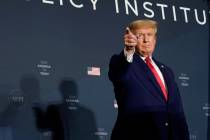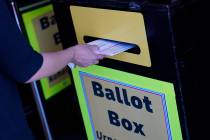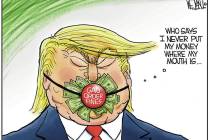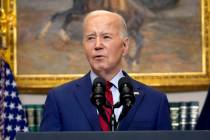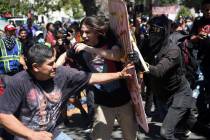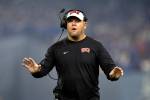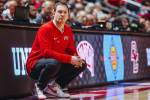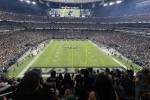EDITORIAL: Facilities the issue for UNLV football
As this editorial rolled off the presses Saturday, Bobby Hauck was preparing for his final game as UNLV’s football coach. On Friday afternoon, Mr. Hauck submitted his resignation, just ahead of Saturday’s game between the Rebels and their archrivals from Reno. His resignation takes effect Monday.
But the Rebel football team doesn’t have a coaching problem. It has a resource problem that no number of coaching changes can fix. And until UNLV football gets more financial support from the community — through fundraising and ticket sales — to improve some of the worst college football facilities in the country, the Rebels will never be consistent winners, never be good enough to prevent coaching staffs from being replaced every four to five years.
Mr. Hauck, like most of his predecessors at UNLV, got quite familiar with the hot seat. He was on it last year. Then the Rebels logged their first winning season and first bowl appearance in 13 years. It marked such a leap for the team that Mr. Hauck was awarded a three-year contract extension and a pay raise through the 2016 season.
This season, however, marked a return to old form. Before Saturday’s game against UNR, the Rebels had just two wins — the same number of UNLV victories as each of Mr. Hauck’s first three seasons, leaving his five-year record at 15-48. The team’s stretches of poor play and alarming lack of competitiveness in several games had already forced the university’s athletic director, Tina Kunzer-Murphy, to contemplate canning Mr. Hauck.
Instead, Mr. Hauck hit the reset button for her, a fortuitous decision, as the university would have had to pay a $700,000 buyout if it fired Mr. Hauck, who had two years left on his contract. But he will still receive a $400,000 payment from UNLV, which will then likely pay even more to hire a replacement staff — for a program that already loses money, from an athletic department budget already stretched to the breaking point by a budget deficit of more than $2 million.
Most universities lose money on college athletics but reap real benefits from media coverage of sporting events, which elevate an institution’s brand and help attract future students. But almost no universities lose money on football. In fact, they count on football to cover the financial losses of almost every other athletic program. At UNLV, men’s basketball has the burden of paying the bills.
Major college sports is an arms race, and the leaders spend money to make money. They upgrade their practice facilities, locker rooms and weight rooms to compete for and develop better student-athletes. They award fat contracts to successful coaches to lure them from competitors or keep them from leaving. And they upgrade their stadiums to give everyone from major donors to middle-class families a first-class game-day experience. Failing to do so means falling behind, which inevitably leads to losses, which quickly puts programs at rock bottom — where UNLV football is.
Its practice facilities, workout rooms and stadium are among the country’s worst. The university’s push for a new stadium on campus or between the university and the Strip — and getting the football team out of antiquated, isolated Sam Boyd Stadium — has been delayed until the 2017 Legislature. Whether that plan comes together could very well determine the future of the football program.
Mr. Hauck’s exit and the hiring of a new coach won’t make any difference if the university and the team’s supporters can’t give Mr. Hauck’s replacement the funding and the facilities necessary to compete. And if the university can’t attract the philanthropy necessary to pay for facility upgrades, or the political and public support necessary to build a new stadium that also can support tourist-attracting, revenue-generating sports and entertainment events, UNLV must evaluate whether it should have a football program at all. One way or another, the UNLV athletic department should be completely self-sustaining; Nevada taxpayers should not be subsidizing college sports.
Yes, Las Vegans are notoriously fickle sports fans, many of whom have loyalties to other schools. And, yes, college sports can distract from the far more important missions of universities: creating human capital for local economies. But college teams also unite people and draw more people into university communities. They rally entire states. And they boost fundraising for all university programs.
Ms. Kunzer-Murphy may well have been prepared to fire Mr. Hauck today. He took that decision off her plate. But if nothing else in the Rebel football program changes, UNLV will be searching for another new coach a few years from now. Mr. Hauck wasn’t the problem.









